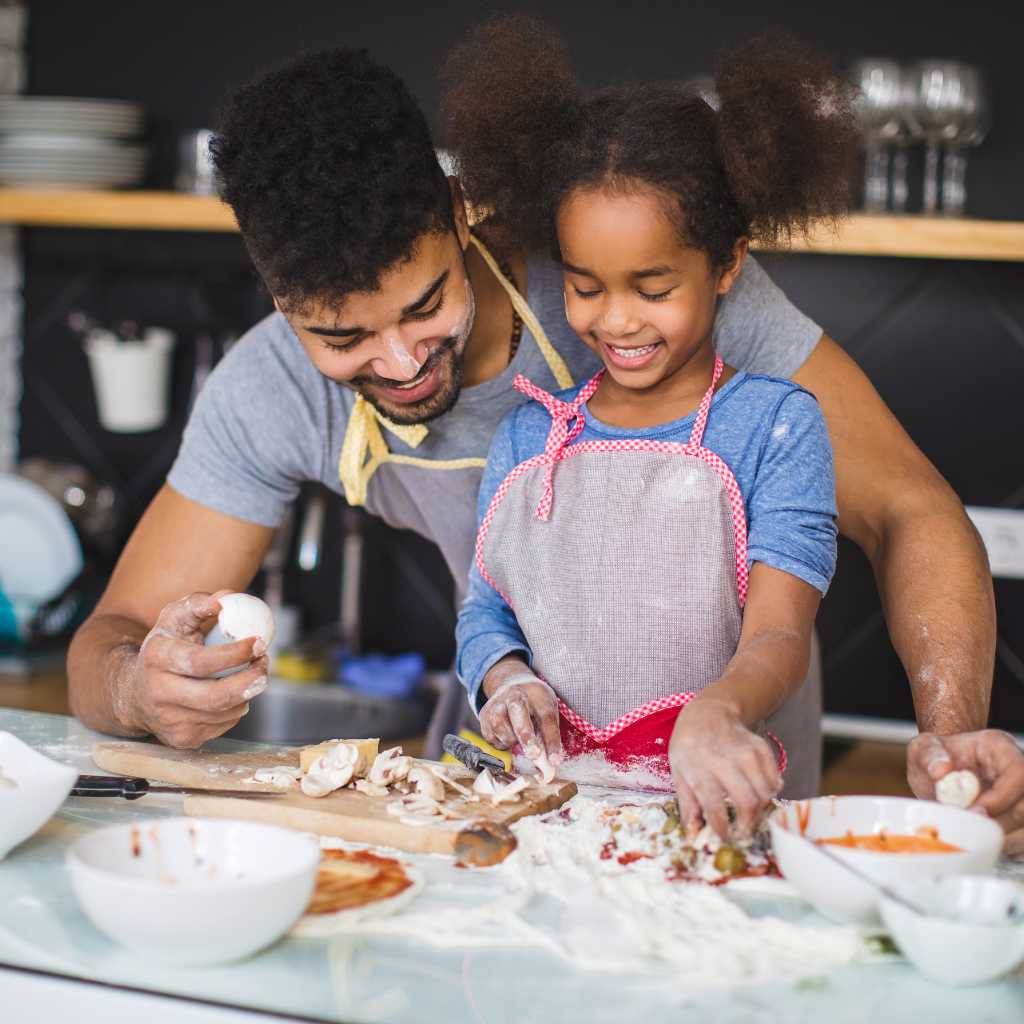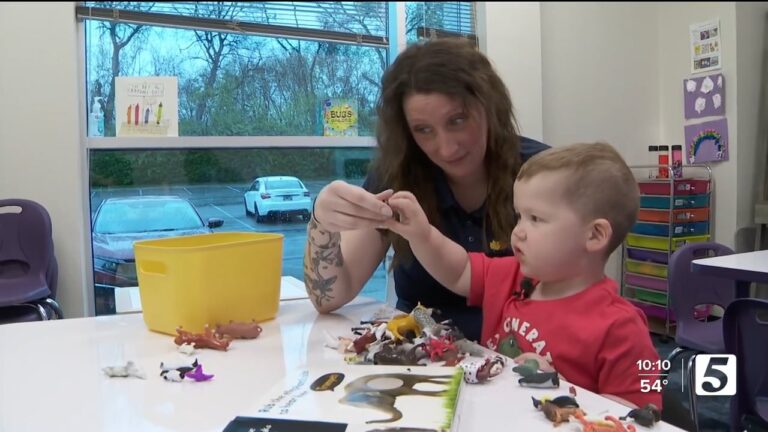Table of Contents
How can autism and cooking come together to create meaningful holiday moments?
When we think of the holidays, the kitchen becomes the heart of the home: the place where flavors, laughter, and learning come together. But how can autism and cooking come together to create meaningful holiday moments? It may seem challenging, but it is also an invaluable opportunity to strengthen skills, create memorable moments, and enjoy the holiday spirit together.
Children with autism spectrum disorder (ASD) and their families may face unique challenges in certain everyday moments, such as cooking with autism. While every family has its own traditions, preparing holiday meals requires some general considerations. Whether it’s Thanksgiving, Christmas, or New Year’s, the holidays are about having fun and creating fond memories.
If you’ve ever wondered how to make autism and cooking an enriching experience for your child and yourself, this ABA Centers of Tennessee blog gives you four essential keys to make it happen.
1. Before You Start Cooking with Autism: Key Considerations
Including your child with autism in the kitchen requires more than just choosing a recipe. Here are some essential things to consider about autism and cooking:
- Safety First: Assess whether your child understands basic concepts such as avoiding the heat of the oven and stove or handling utensils such as forks and knives. If not, take advantage of this activity to teach them these measures patiently.
- Understanding Instructions: Recipes with fractions for measurements such as 1/3 (one-third) or abbreviations such as “tbsp” (tablespoon) can be confusing for some children with autism. When you are cooking with autism, make sure your loved one has the specific skills to complete a particular recipe. Simplify or adapt language based on what your child understands.
- Preferences and Sensitivities: Holidays, autism, and cooking can be pleasurable experiences for everyone. However, when it comes to food and autism, some children may have specific sensory sensitivities. Choose recipes and foods that include ingredients that are to their liking and do not overstimulate their senses. Considering your child’s interests can make it easier to learn a new skill and motivate them to participate.
- Participate in Shopping: You can elevate the cooking experience with autism by involving your child in shopping. Teach them how to make a shopping list, take them with you to the store, and ask them to find the items to buy, thus encouraging independence, communication, and interaction skills.
- Predictable Routine: Talk to your child about the activity ahead of time. Incorporating cooking and mealtime into your daily routine can help reduce anxiety and increase excitement about participating. For example, you can rely on visual schedules that include cooking and eating at a specific time.
2. Autism and Cooking: Strategies for Success
Cooking with autism is an opportunity to build skills, form bonds, and include your loved one with ASD in festivities and daily activities. These strategies can help you make it easier and more fun:
- Include Recipes and Visual Aids: Print recipes with step-by-step pictures. Digital guidebooks will make it easier to understand and keep the process organized. To begin, start with essential, easy-to-follow recipes. The idea is to provide simple instructions in simple steps, preferably with pictures that represent each step.
- Provide Clear and Adapted Instructions: Facilitate the learning process with a variety of directions according to your child’s needs. For example, use verbal directions by explaining the steps in a simple way; visual directions by using pictures, charts, or items the child can observe to complete a step; physical directions by gently guiding the child to perform a specific action; gestural directions by pointing or making movements that direct their attention; and even positional directions by strategically placing utensils or ingredients to facilitate the flow of the activity. Adapting these strategies can turn autism and cooking into an accessible, structured, and enriching experience.
- Encourage Sensory Exploration: Let your child touch, smell, and observe the ingredients. Cooking with autism can be especially helpful for children who need more sensory stimulation or develop tolerance to certain textures or aromas.
- Strengthens Fine Motor Skills: Some children with ASD may have difficulty with fine motor skills. When it comes to autism and cooking, activities such as whipping, cutting with a plastic knife, or decorating cookies help strengthen these skills. As your child progresses, involve tasks of more incredible difficulty.
- Promote Patience and Emotion Management: Mistakes are inevitable, but they are also learning opportunities. Help your child manage their frustration and positively reinforce them when they try again. Let them know that there is no mistake that they can’t correct and that “little problems” should have “little reactions.” You can even reinforce this by using appropriate language such as “It doesn’t matter; we can always try again.”
3. Why Cooking with Autism is a Learning Experience?
Autism and cooking can go hand in hand as a creative way of learning. Psychology Dissertations studies highlight the following benefits:
- Encourages Communication: Talking about the steps in a recipe or describing expanded ingredients can help develop vocabulary, as well as foster patience, turn-taking skills, and following directions.
- Provides Structure and Routine: Cooking follows a logical order, ideal for children who prefer predictable activities. Plus, it’s a daily activity that you can include in your child’s routine.

- Stimulates Independence: Learning to cook is a vital skill that prepares them for the future and improves teamwork, social awareness, and the skills necessary for academic and professional success.
- Strengthens Emotional Bonds: Cooking together creates memories and strengthens the relationship between parents and children.
- Stimulates Creativity: Decorating a cake or cookies or even creating new recipes helps them express their creative side and provides new alternatives for self-expression.
4. ABA Therapy: A Key Tool for Independence
Cooking with autism is much more than a recreational activity; it is an opportunity to strengthen essential skills that impact the daily life of a child with autism. These types of activities are a perfect complement to ABA (Applied Behavior Analysis) therapy. This methodology is a powerful resource for learning for children and adolescents on the spectrum, offering a structured and practical approach to teaching essential skills. ABA therapy provides the following benefits for autism:
- Fostering Sensory Tolerance: For many children with autism, certain textures, aromas, or tastes can be challenging. ABA therapy helps to gradually desensitize these reactions, creating a positive environment where the child can explore new foods and develop greater sensory flexibility.
- Break Tasks into Attainable Steps: Cooking with autism may seem like a complex task, but ABA therapy uses task breakdown to simplify and teach each step clearly. For example, instead of merely saying “make a cake,” it teaches how to measure ingredients, mix them, and place them in the pan, step by step, with support as needed.
- Reinforce Positive Behaviors: Motivation is essential in learning, and ABA therapy uses positive reinforcement to celebrate a child’s accomplishments, from completing a step correctly to trying something new. This approach not only enhances the autism experience and cooking but reinforces confidence and enthusiasm for learning.
- Promote Independence in Multiple Areas: Beyond cooking, ABA therapy fosters skills that extend to other aspects of daily life, such as getting dressed, planning routines, or even organizing a day of activities. Cooking becomes an educational tool that encourages children to apply what they learn in different contexts.
With the support of an ABA therapist, cooking with autism during the holidays becomes not only a fun and meaningful activity but also an educational experience that fosters the child’s autonomy and self-efficacy, preparing them for a more independent future.
ABA Centers of Tennessee and Autism Support During the Holidays!
Autism and cooking are not only compatible but can be a magical combination for enjoying the holidays and building essential skills. With a tailored approach and precise strategies, the kitchen becomes a space for learning, connection, and joy.
Take advantage of this holiday season to explore cooking with your child. And if you need extra support around the holidays or any time of year, consider how ABA therapy can make a big difference.
At ABA Centers of Tennessee, we provide autism support and ABA therapy to all families in Brentwood, Hendersonville, Nashville, and Madison. Call us at (844) 423-9483 or contact us online. Happy holidays and happy times in the kitchen!







